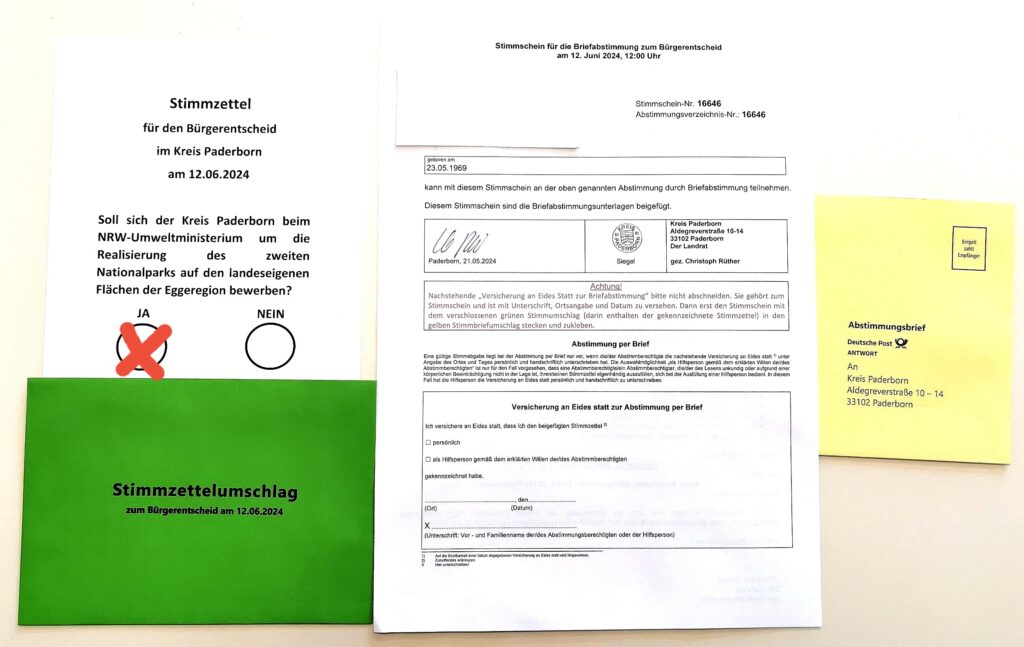
YES to the Egge National Park
The Egge, a central German mountain range between the districts of Paderborn and Höxter, is a wonder of nature. Due to its geological composition and the many different types of landscape, it is a very special place within Germany. Unfortunately, there are only very few areas left in Germany where we can experience nature in all its splendour and vibrancy. The Egge is definitely one of these unique places and therefore deserves special protection as a national park.
Important information about the Egge National Park is summarised below.
- Thoughts in favour of a national park
- Background for National Park
- Referendum
- FAQ: Frequently asked questions
- Important links
Thoughts in favour of a national park
In view of climate change, the impending environmental changes, the extinction of species and the urban sprawl and sealing of the landscape, we should leave at least a few habitats completely to nature. Unfortunately, today’s people almost always make decisions based solely on economic considerations. Nature and creation, on the other hand, prioritise survival and have always developed effective solutions for all kinds of environmental changes and adapted life to the new situations. This is also a key message of the book ‘Umdenkbar’, which has just been published. Nature finds the best solutions when it can develop freely. Only a national park offers this unrestricted freedom. We humans benefit from the resulting biodiversity and learn many amazing solutions that enrich our knowledge. Anyone who is committed to biodiversity, wants to do something about climate change and preserve creation will vote ‘yes’ to the national park.
The majority of voters have no direct advantages or disadvantages if the harrow becomes a national park or not. Therefore, they do not care about the choice. However, if we look back into the past, we realise that the dense forests with undergrowth, the insect-rich flower meadows and fields with cornflowers have increasingly disappeared over the last few decades. There is no longer any room for species-rich nature in forests and fields that have been trimmed for efficiency and profitability. Today, most fields and forests have become barren and boring and are only of limited use for recreation. Anyone who watches old local films such as ‘Immer diese Radfahrer’ with Heinz Erhardt and compares the landscapes there with today’s landscapes will immediately recognise the loss.
In a national park, nature has a chance to develop these lush landscapes again. This creates an area right next to us where we can escape from everyday life and find peace and quiet. This is becoming increasingly necessary as our everyday lives become more and more stressful and our worries and hardships increase. The local recreation factor is extremely valuable and helps us to find ourselves again without having to travel far away. This is what makes a national park so valuable. It also allows our children and all future generations to experience what nature is and means. That’s why you should vote ‘Yes’ to the national park. Our children and grandchildren will thank us for it.
Background for second national park in NRW
With an area of 0.6%, Germany is almost at the bottom of the league in Europe when it comes to nature conservation. In order to preserve biodiversity and strengthen suffering ecosystems, 10% of Europe’s total area is to be placed under strict protection. The state of NRW has therefore decided that a second national park should be created in NRW with the consent of the local population. The Egge is the most suitable area for a national park. This is why there is now a referendum.
The state of North Rhine-Westphalia (NRW) has approx. 846,400 ha of forest in 2024. Of this, 12,400 ha of forest owned by the state of NRW are to be made available for the future Egge National Park. Note: 1 ha = 10,000 m² = 0.01 km²
Summary of the information:
- The Egge National Park is to cover 12,400 hectares. That is 1.4% of the forest in NRW and 0.1% of the forest in Germany.
- Only areas that are owned by the state of NRW and therefore belong to all citizens of NRW and are not privately owned should be used for the Egge National Park. Nobody will be expropriated because of this.

Referendum:
From Whitsun 2024 until 1 June 2024, the districts of Paderborn and Höxter will send each resident an official letter with the election documents for the ‘Egge National Park’ referendum. The voting documents consist of a ballot paper, a green envelope for the ballot paper, a declaration in lieu of an oath and a yellow envelope with the address of the respective district administrator. Each eligible voter is asked the following question on the ballot paper:
‘Should the district of Paderborn (or Höxter) apply to the NRW Ministry of the Environment to realise the second national park on the state-owned land in the Eger region?’
Every eligible voter can answer this question freely by ticking ‘Yes’ or ‘No’ on the ballot paper. However, nature and I would be very happy if you ticked ‘Yes’. The ballot paper is then placed in the green envelope. The affidavit must be signed by the voter. The green envelope with the ballot paper and the signed affidavit must then be placed together in the yellow envelope with the district administrator’s address. Finally, the yellow envelope must be placed in a letterbox at the post office or handed in directly at the post office. This should be done by 10 June 2024 at the latest so that the envelope arrives at the respective district office in time for 12 June 2024 and is valid. Of course, the envelope can also be handed in directly at the district hall by 12 noon on 12 June 2024. The entire process is free of charge for the voter.
Summary of the information:
- The referendum only takes place as a postal vote.
- Anyone aged 16 or over who is German or a citizen of an EU member state and registered as resident in the Paderborn or Höxter district is eligible to vote. There are no further restrictions.
- The election documents will be sent automatically by the respective district to all residents entitled to vote. This will take place from 21.05.2024 to 01.06.2024.
- A valid vote is cast by ticking ‘Yes’ or ‘No’ to the Egge National Park.
- The completed ballot paper is placed in the green envelope, the affidavit is signed and placed in the yellow envelope together with the green envelope. This should then be returned by post as soon as possible. The whole process is free of charge.
- The ballot paper must arrive at the district office by 12 June 2024 at the latest. Anyone using the letterbox should therefore return it by 10 June 2024 at the latest.
- Anyone who has not received election documents by 1 June 2024 and is eligible to vote can apply for them free of charge from the respective district.
FAQs: Frequently asked questions:
All the following questions and their answers about the Egge National Park come from Nationalpark.NRW of the Ministry for the Environment, Nature Conservation and Transport of the State of North Rhine-Westphalia. More questions about the National Park are answered there. However, all questions and answers are in German.
- Why is the Egge suitable as a national park?
- Who sets the rules within a national park?
- Who bears the costs for the national park?
- Is there a minimum size? No.
- Will there be expropriations for the national park? No.
- Are there buffer zones? No.
- Are there any restrictions on the agricultural use of neighbouring fields? No.
- Does the national park have an impact on the drinking water supply? No.
- Is the supply of wood at risk? No.
- Are mushrooms and berries allowed to be collected in the national park? Yes – with restrictions.
- Is the expansion of renewable energies (wind power, photovoltaics, …) jeopardised? No.
- Is the expansion of the infrastructure (rail, road, etc.) jeopardised?
- Is hunting allowed in the national park? Yes.
- What are the economic effects of the national park?
- Are hiking, cycling and horse riding permitted in the national park? Yes.
- Will the existing hiking trails be retained? Yes.
- Will the national park be fenced in? And who is allowed to enter it?
Important links:
To the Egge National Park:
- Egge National Park: What is the Egge and why is it something very special and should become a national park?
- NRW National Park: Information from the state of North Rhine-Westphalia.
- Facts about the national park: Compilation of facts in favour of a national park and refutation of myths.
On the referendum:
- Referendum on the Egge National Park application procedure
- Paderborn district: Questions and answers on the Egge National Park referendum
- Kreis Höxter: Information on the Egge National Park referendum.
On the state of the forest:
- Forest areas in Germany – Federal Statistical Office Germany
- Waldinfo.NRW: Interactive information on forests in NRW.
- Germany almost at the bottom of the EU in nature conservation – news from 11 July 2023
- State of German forests: Four out of five trees are sick – Spiegel 13.05.2024
Examples:
- Example of the Eifel National Park: visitor monitoring and regional economic effects 2024 (summary)
- Example of the Eifel National Park: Performance reports from 2004 to 2022

